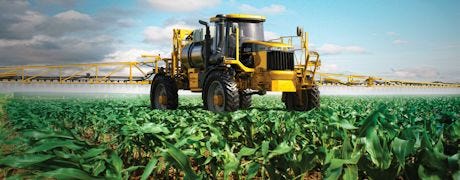
Whether or not to do something on your own, or hire someone to do it for you is a decision that growers have mulled over for generations. And when you add to the equation the possible purchase of equipment, it makes the decision-making process all that much more difficult.
The decision to buy your own sprayer, or hire a custom sprayer is just one of many determinations made in a farming operation. But by carefully evaluating many different variables, decisions can be made more smoothly.
All about size

The decision to buy your own sprayer, or hire a custom sprayer is just one of many determinations made in a farming operation. But by carefully evaluating many different variables, decisions can be made more smoothly.
“The size of the operation is a huge factor,” says William Lazarus, an Extension economist and professor of applied economics at the University of Minnesota. “For example, producers farming thousands of acres could justify the purchase of a highboy of their own because the cost of owning might be more attractive than paying someone to do custom applications.”
According to Lazarus, taking a close look at the expected annual hours of operation and determining how long you might own the sprayer is just a sampling of the many factors to consider. This is why he developed the Farm Machinery Economic Cost Spreadsheet (faculty.apec.umn.edu/wlazarus/interests-farmmachinery.html), which can help estimate a breakeven point using information you provide. The inputs include labor rate, annual hours of use, purchase price, trade-in value, acres covered, and repair and maintenance costs.
“If you’re potentially spending thousands of dollars on a piece of equipment, isn’t it worth taking a look at all those variables before you make a purchase decision?” asks Lazarus.
When it comes to spraying, other aspects must be considered when deciding to do it yourself or to have it done for you. These include factors such as timeliness and reliability, the value of your time, and your investment capacity in making farm-related purchases.
“You need to start by putting everything in a partial budget framework and look at positive effects vs. negative effects,” says Kent Olson, a professor of applied economics at the University of Minnesota. “You can input the easier numbers and do some initial calculations, but you eventually need to look at the more subjective numbers and make a determination.”
Beyond equipment cost
Olson says deciding whether or not to do it yourself shouldn’t be based solely on the cost of the equipment. In short, you need to ask yourself a number of key questions: How is your time best used? Is your time best served sitting in the tractor (or sprayer) for all those extra hours doing the applications yourself, or is there something else you could be doing to make money for your operation?
Given the amount of money needed to invest in either a good pull sprayer, or a decent self-propelled model, Olson says depreciation and interest should also be considered, as well as any capital recovery costs and possible tax-related implications.
At a minimum, Olson says the top variables to look at right away are number of acres to be covered, the estimated cost of the machine (including repairs and upkeep), and the value placed on your time.
“Younger farmers, who are just starting out, might be able to better absorb the cost of buying a sprayer, assuming they will be farming for many years in the future,” says Olson, who is also the author of a farm management book titled “Economics of Farm Management in a Global Setting,” available through Amazon. “But if a farmer is nearing retirement, buying a piece of equipment that will get limited use — like a sprayer — may not be a good investment.”
- Yontz writes from Urbandale, Iowa.
- Solution Center is independently produced by Penton Farm Progress through support from SureStart® II herbicide. For more information, visit GetMoreTime.com.
Check out these Solution Center Pages:
About the Author(s)
You May Also Like




